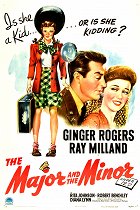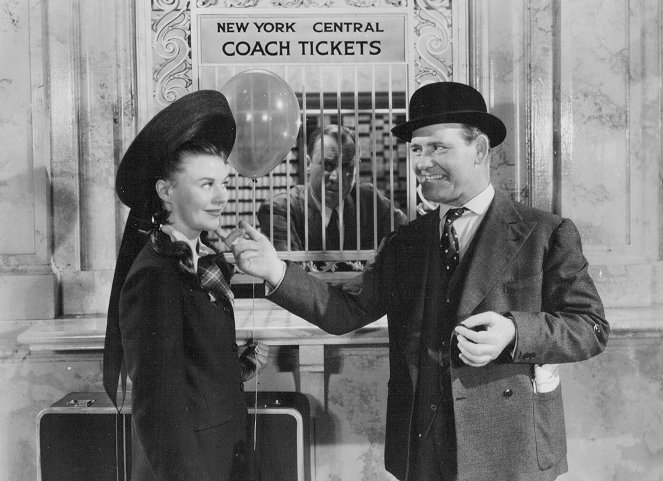Regie:
Billy WilderKamera:
Leo ToverMusik:
Robert Emmett DolanBesetzung:
Ginger Rogers, Ray Milland, Rita Johnson, Robert Benchley, Diana Lynn, Edward Fielding, Lela E. Rogers, Marie Blake, Charles Smith, Bess Flowers (mehr)Inhalte(1)
Kosmetikerin Susan Applegate verlässt endgültig New York, um anderswo ihr Glück zu suchen. Doch ihr Vorhaben droht schon am Bahnhof zu scheitern, als sie nicht genug Geld für die Fahrkarte aufbringen kann. Susan kann sich nur ein Kinderticket leisten. Da hat sie eine Eingebung, klaut einen Luftballon, besorgt sich einen Lutscher und wird zur elfjährigen „Su-Su". Ihr Plan geht auf, doch im Zug begegnet sie dem gutherzigen Major Philip Kirby, der dem „frühreifen" Mädchen verfällt. Gekonnt und galant wie „Fred & Ginger" bekommt Billy Wilder in seiner romantischen Komödie das leicht pikante Motiv eines Mannes, der einer Kindfrau verfällt, in den Griff. Mit seiner Bearbeitung sorgte er dafür, dass die Einwände der Zensoren, die er schon während des Drehs ignoriert hatte, bei der ersten Sichtung ins Leere liefen. Die Provokation, die von der Figurenkonstellation ausging, insbesondere von der Rolle eines verdienten Majors, der sich in eine Minderjährige verliebt, wurde durch Hollywood-Beau Ray Milland entkräftet, der so inszeniert wurde, dass er sich seiner Gefühle für das vermeintliche Mädchen nicht bewusst ist. Des Weiteren war die Rolle der Susan Applegate, zwischen Kindlichkeit und Adoleszenz angesiedelt, durch die Besetzung mit Ginger Rogers jederzeit als erwachsene Frau wahrzunehmen. (arte)
(mehr)Kritiken (1)
A remarriage comedy with an unusually conspicuous ephebophilic subtext. Instead of tap dancing, this time the wonderfully versatile Ginger Rogers has to switch between different roles depending on what the situation and the particular man requires (first the conductor, then the cadets, Ray Milland throughout). The initial promise of emancipatory entertainment about a woman who rejects her assigned role is soon fulfilled. If we ignore the unintentional perversity of the main situation (and the intertextual joke with Veronica Lake), the story does not leave the neutral realm of milquetoast witty banter. Due to the numerous risks of slipping into a primitive farce based on changing identities through changing costumes, it is still an extremely tasteful way of showing the multiplicity of roles that American women had to play in the interwar period. In a different era, when society didn’t need women – coarsely written – so much, such a respectful and – with gritted teeth – “feminine” film probably would not have been made. 75%
()

